Germany's stance on Ukraine during the dramatic months before and after Russian invasion unfolded provoked a range of assessments and emotional responses on the part of the Ukrainian society. It has often been seen as disappointing that the EU's most powerful economy remains hesitant to provide the weapons Ukrainian soldiers need, and moreover, hampering such efforts by other nations. However, one of the biggest critics of the German government and some individual politicians, Ambassador of Ukraine to the Federal Republic of Germany Andrij Melnyk, hopes that Berlin will pace up and scale up its economic and humanitarian aid, as well as accelerate security assistance. The first signs of such developments are already being observed.
Andrij Melnyk sat down with Ukrinform to tell of his expectations, current moods in the German government and opposition circles, citizen diplomacy, and more.
THE MAIN ADDED VALUE OF SCHOLZ'S VISIT IS THAT IT WAS PRECISELY IN KYIV WHERE HE FOR THE FIRST TIME SUPPORTED UKRAINE’S STATUS OF EU MEMBERSHIP CANDIDATE
- Last week we saw a long-awaited Kyiv visit of German Chancellor Olaf Scholz, who was accompanied by well-known supporters of "peace plans" – French President Emmanuel Macron and Italian Prime Minister Mario Draghi. Ahead of the visit, fears existed that the team would exert pressure on the Ukrainian leadership, trying to push it toward concessions in order to return to business as usual with Russia as soon as possible. Is there anything signaling that they are in fact putting such pressure?
- Indeed, such rumors circulated on the eve of Chancellor Olaf Scholz’s important visit to Kyiv. Unfortunately, it has to be admitted that in Germany, the number of votes is growing in favor of striking a truce ASAP, at any cost, because few can really imagine Russia being defeated. The Germans are frankly terrified to suggest that this war, which has already led to unprecedented inflation, may drag on for a really long time and threaten their well-being. In fact, all these decadent sentiments are yet to pose a significant challenge for us in the future as they will increase pressure on the German government. At the same time, I would like to reassure your readers that there was no hand wringing during the said visit of the European "quartet."
- You actively expressed your expectations of this visit: promises of arms supplies and clear support for Ukraine's European integration aspirations. We have not heard anything fundamentally new about armaments, while the EU-related promises were allegedly voiced with “some reservations.” The survey showed that 55% of Germans stay positive about the outcome of Scholz's visit. How would you rate it?
- First of all, the very fact that Chancellor Scholz actually made this visit is important. To be honest, not only the leading politicians, but also the majority of Germans, felt a bit awkward about the pause dragging on so indecently, as well as about the German leadership arranging a Kyiv visit for so unreasonably long.
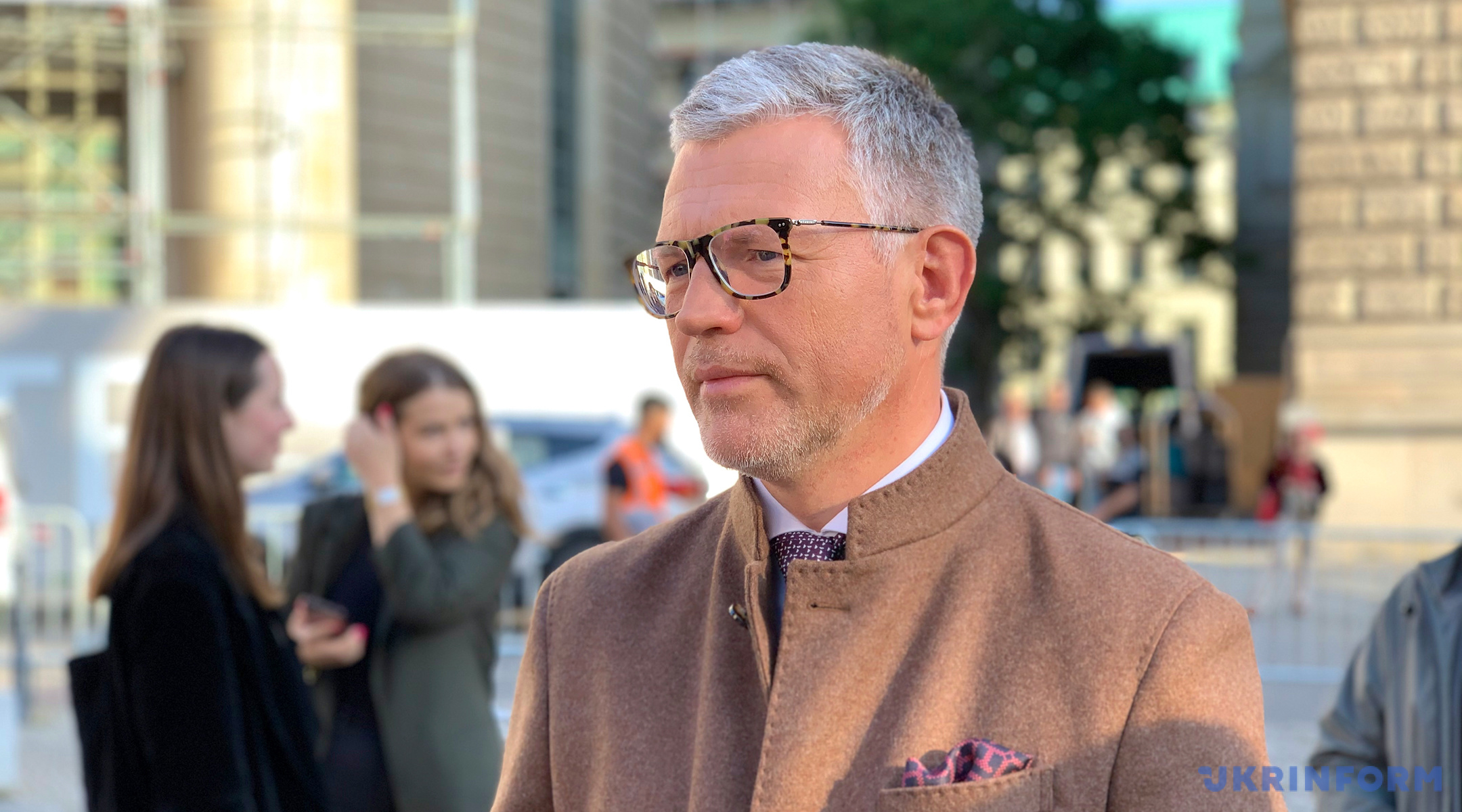
As an ambassador, of course, I’d like this to be a full-fledged bilateral visit. After all, only in this format could we raise the most critical issues that are of concern to us today, especially the outright delay in heavy arms supplies on the part of Berlin. However, in the end, it seems to me that this joint trip of the four leaders of EU states was especially useful, as it allowed us to fully focus on the strategic issue of Ukraine's future membership in the European Union. And I’m glad that after our long diplomatic efforts, both public and those behind the scenes, undertaken in Berlin over the past weeks, it was in Kyiv that Chancellor Scholz first formally spoke in support of Ukraine's EU candidate status. Apparently, this is the main added value of the Kyiv visit by the Federal Government chief.
I HOPE FOR ULTIMATE SECURITY ASSISTANCE FROM GERMANY
- After the Ramstein 3 meeting, German Defense Minister Christine Lambrecht announced her intention to hand over three Mars II multiple rocket launchers to the Armed Forces of Ukraine instead of the previously promised four. At the same time she once again complained that the Bundeswehr has limited capabilities and is now giving away literally the last remaining heavy weapons. Meanwhile, private business initiatives to transfer the relevant equipment saw no government approval. Is there a way out of this vicious circle?
- We understand the limited capabilities of the Bundeswehr following years of austerity. At the same time, I personally am still convinced that the available potential of military assistance to Ukraine to repel Russian aggression fully allows further arms supplies. We have some insider tips. Nothing prevents Berlin from approving a move to send our Armed Forces at least part of some 800 Fuchs transport tanks, 325 Leopard-2 battle tanks, or 380 Marder infantry fighting vehicles, which will in no way reduce the nation’s own defense capabilities. Therefore, I very much hope that the German government will put aside all excuses and provide Ukraine with the maximum possible amounts of military assistance, in particular, from their own reserves.
The second area that we’re focusing on is establishing a truly strategic dialogue with the German defense industry, which is the world’s fourth-largest. Let me remind you that last year Germany exported military products worth over EUR 9.4 billion. Now this is about a short-term supply of older models of heavy weapons. Say, a hundred Marder IFVs I’ve mentioned earlier and 88 Leopard-1 tanks could be delivered to Ukraine in stages throughout the year as they are being upgraded (unfortunately, the German government is still unjustifiably blocking the project ). Also it’s about some powerful medium-term projects. In particular, I hope for Berlin’s support in the purchase of another 10 IRIS-T air defense systems, considered to be one of the coolest in the world and able to close the sky over Ukraine in the coming years.
I am proud that my team and I have managed to overcome fierce political resistance and, in close behind-the-scenes cooperation with the manufacturer, Diehl Defense, have won a contract for the purchase of first such system, worth EUR178 million, at the expense of the German government. Special thanks to Chancellor Scholz for this. By the way, even the Bundeswehr is yet to receive such air defenses.
I’m also waiting for the "green light" from Berlin to purchase 100 new Panzerhaubitze 2000 self-propelled artillery units. We have already received an offer from the German industry.
I intend to pay special attention to establishing strategic cooperation toward building up our Navy, as Germany produces some of the world's best frigates, corvettes, and submarines.
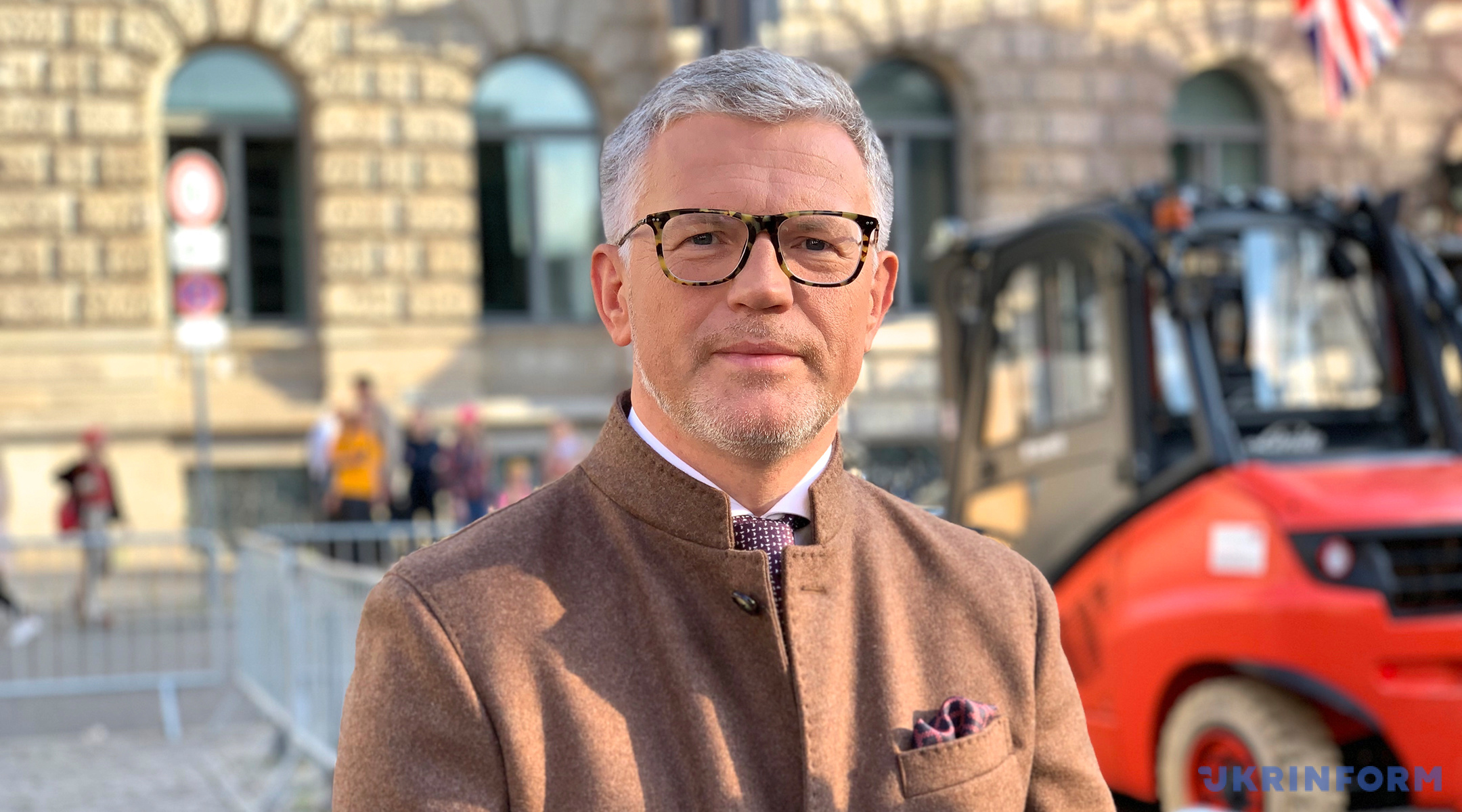
CDU/CSU BLOCK MAKES A U-TURN UNDER NEW LEADER
- Currently, the CDU / CSU bloc, which has done a lot over the 16 years in power to make Putin who he is now, actively supports us, while criticizing their government. What is the reason behind the flip?
- In fact, I’m very positively surprised by such a U-turn on the part of the CDU/CSU, which, unfortunately, had taken a negative position on providing weapons to Ukraine over the recent decades. First of all, in my opinion, this is due to the figure of the new leader of the Christian Democrats, Friedrich Merz, who, unlike Angela Merkel, is pursuing a very proactive course both in security assistance to Kyiv and in support of Ukraine’s future EU membership. I’m glad that from his first days in office, I managed to set up really close and trustworthy contact with Mr. Merz.
Largely thanks to the coordinated steps by the CDU/CSU opposition faction, coordinated with the Ukrainian side, the Bundestag on April 28 this year passed a historic decision to give Kyiv some heavy weapons.
It is clear that the said political force is guided primarily by its own party interests, trying to split the so-called "traffic light coalition" because both the Greens and the Liberals are ready to go much further in security assistance to Kyiv. But this is the course most supported by voters: today the CDU/CSU has the highest popular support rating (28%), followed by the Greens (23%), with the largest government party SPD taking only third place with 19%.
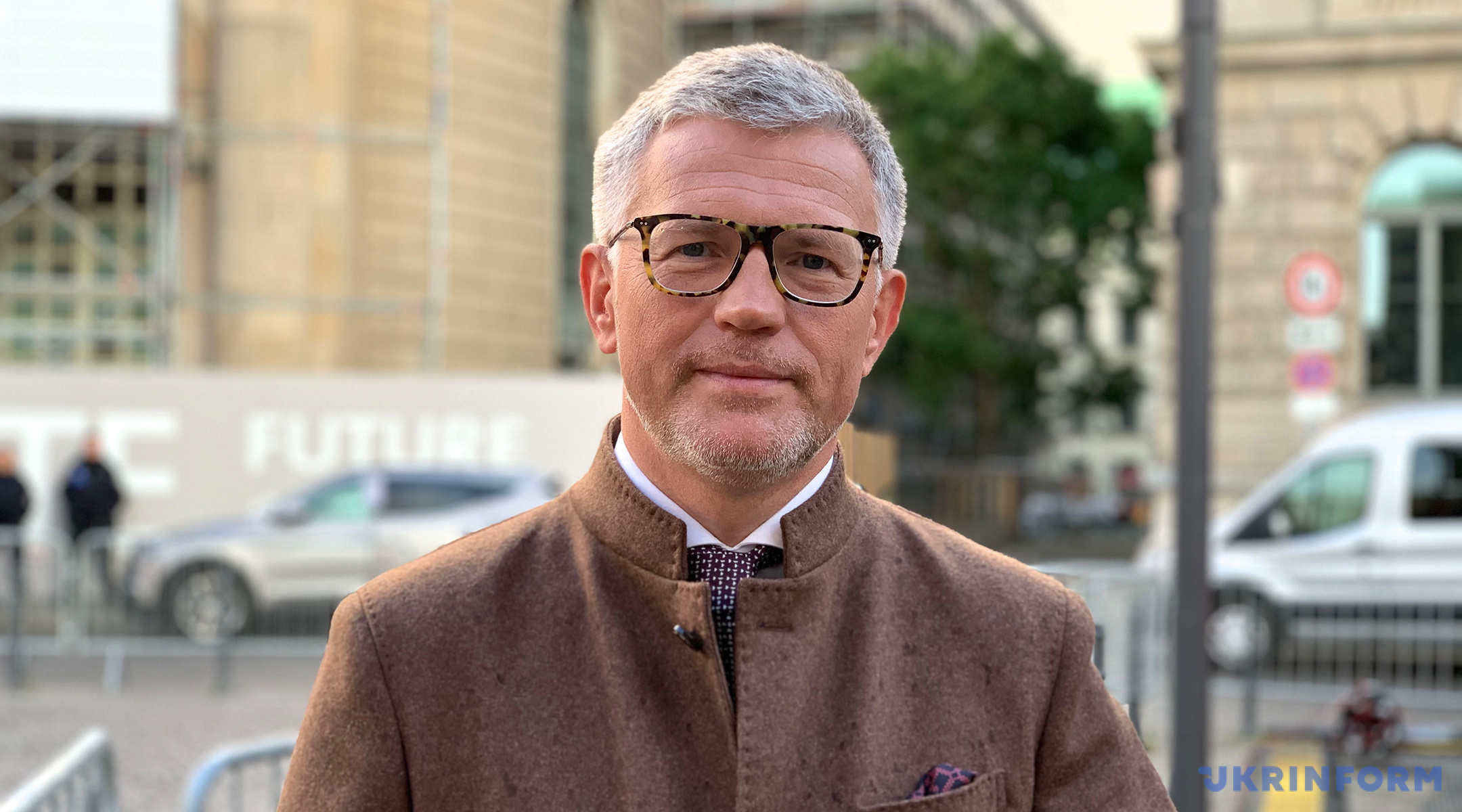
MERKEL'S EXCUSES THREATEN ALL HER POLITICAL LEGACY
- Ex-Chancellor and former CDU leader Angela Merkel gave her first big interview and made several statements, showing that she doesn’t consider herself responsible for the policy of strengthening Putin and even increasing her country's dependence on Russia. She also said that the issue of her possible mediation is not on the agenda at the moment. How would you comment on that?
- To be honest, I was really shocked to see this first interview the Chancellor gave. The thing is that it was conducted by a good friend of mine, Spiegel journalist Alexander Osang. So I openly asked him to ask Merkel a number of questions, which he kindly agreed to do, and two of them came up. The first was whether Merkel felt personal guilt and responsibility for her policy of appeasing Putin that led to the Kremlin's aggression, and the second was whether the ex-chancellor now finds wrong her decision to block Ukraine's NATO accession back in 2008, which allowed Russian aggression to kill Ukrainian people.
Her answers are well known: Merkel strongly denied that she had made any mistakes in flirting with Russia. So it was I who had to harshly slam these statements in the German press.
I think that such an incomprehensible lack of self-criticism and all these absurd excuses will jeopardize Merkel’s entire political legacy. In the end, even President Frank-Walter Steinmeier found strength to acknowledge the fallacy of Germany's previous course toward Russia.
- In the "traffic light" government itself, the Chancellor and Social Democrat politicians are under pressure from coalition partners – the Greens and the Liberals. In your opinion, is a government crisis possible in Germany?
- Contradictions within the coalition escalate constantly, incidentally, in the context of the policy regarding security support for Ukraine. Most observers are of the opinion that if the above-mentioned joint resolution with the opposition on the deployment of heavy weapons for Ukraine had not been adopted, there would have been a real threat to coalition stability. And this threat was prevented.
It is possible that internal contradictions will resurface from time to time. At the same time, I wouldn’t talk of the threat of a government crisis. The main thing for us is that aggression against Ukraine remains and, I’m convinced, will remain No.1 topic, which concerns both the German public (70%) and the political elite. This gives us a chance to see continued and more effective support for Kyiv.
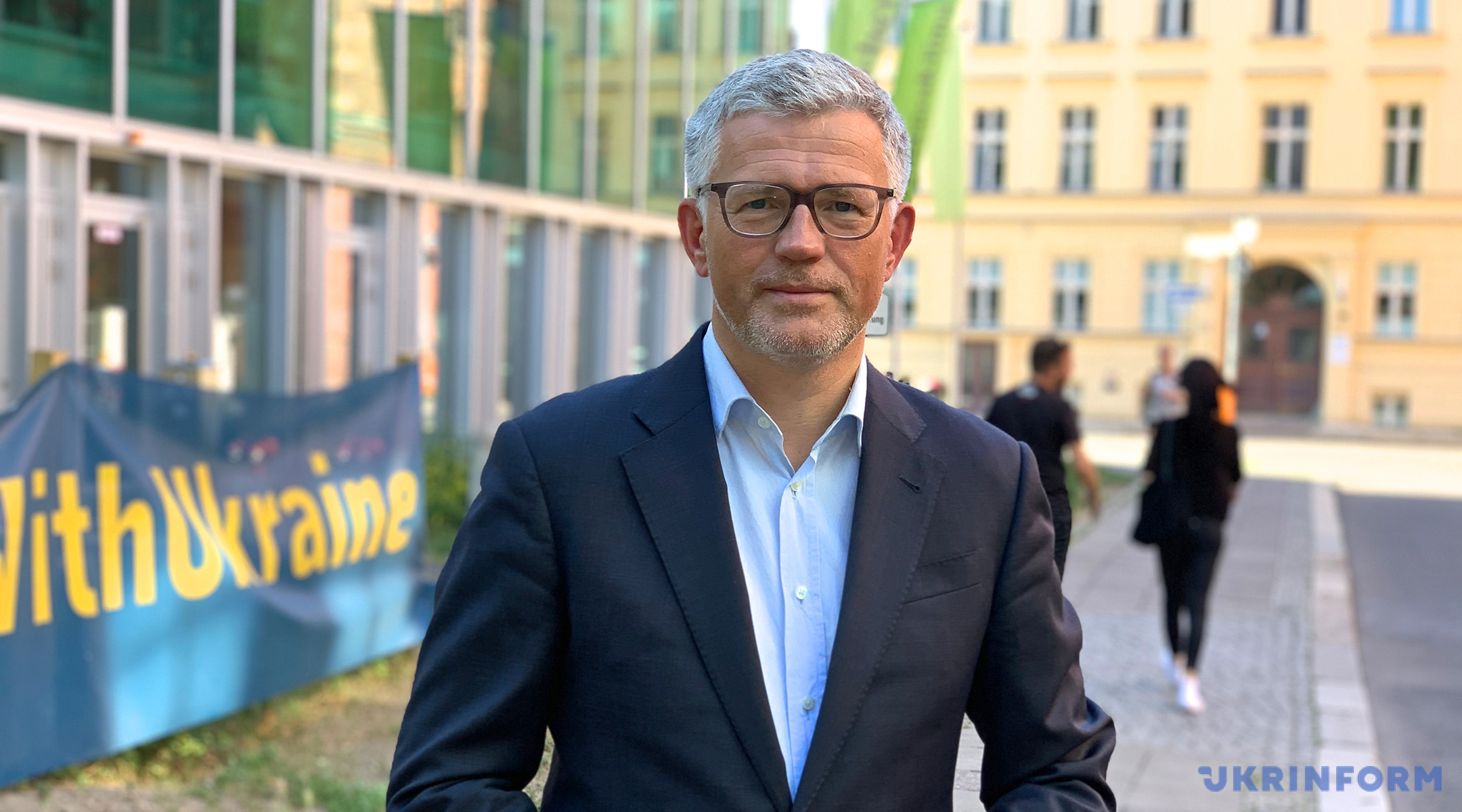
UKRAINE CALLS ON GERMAN FIRMS TO SEVER BUSINESS CONTACTS WITH RUSSIA
- You noted the fact, citing open data, that after the start of the war and introduction of sanctions, trade between Germany and Russia not only failed to decrease, but also expanded. Have officials provided any comment on this report?
- Indeed, the fact that during the first four months of 2022, which is, over the two months of aggression, Russian imports to Germany increased by almost 60%, or about EUR 6 billion (from EUR 9.9B to EUR 15.8B) despite EU sanctions, has become a cold shower for many. And although German exports to Russia dropped by 26.6% in parallel lines, there was an overall increase in trade between Berlin and Moscow by as much as 20%, to EUR 21.9 billion. Moreover, this was due not so much to rising energy prices, which were and remain the main item of imports from Russia, but namely the growth of supplies.
Unfortunately, this topic found not so much publicity in Germany itself, as the government would have to explain these shameful statistics to their people. Therefore, we call on German companies to support the sanctions policy, expressing moral responsibility to sever any business contacts with Russia.
- What does the Ukrainian-German trade look like amid the war?
- Unfortunately, the Russian war to exterminate the Ukrainian state and nation has led to a sharp reduction in our trade with Germany. In the period from January to April this year, trade fell by 11.8%, to EUR 2.3 billion (i.e., minus EUR 300 million). At the same time, exports decreased by only 5.4%, to EUR 957 million (minus EUR 50 million).
It’s really painful.
Unfortunately, there are still many in Germany who seek to reconcile Ukrainians and Russians as soon as possible.
- Recently, you blamed the German government for the fact that Ukrainian refugees (there are about 865,000 of them in Germany, according to official data) are not treated all too well here. This, in turn, infuriated many Germans. But what exactly did you mean?
- I would like to clarify something. I’ve never claimed that our refugees are being treated badly in Germany. I literally said that the Germans should think about why many Ukrainians don’t want to stay in this country and choose to return home. This is an obvious fact.
Undoubtedly, the main reason is the improvement of the security situation in Ukraine and people’s desire to see their families again. At the same time, there are other factors, such as the excessive bureaucracy of the refugee status process, and the fact that Ukrainians often have to deal with Germans of Russian descent working in agencies dealing with foreigners or employment agencies.
Unfortunately, many in Germany are still trying to reconcile Ukrainians and Russians as soon as possible, which is an absolute nightmare for our compatriots after all the suffering they’ve sustained. After all, my phrase was artificially taken out of context, as it was uttered during a heated debate on one of the country's television talk shows, where opponents of arms supplies to Ukraine used their favorite concrete argument, "but we’re helping your refugees."
Despite these circumstances, I have publicly thanked the federal government, the land governments, and the communities for supporting our compatriots, and apologized to the tens of thousands of German volunteers I may have offended.
I WILL NOT SAVE WORDS OF PRAISE IF THERE IS A REAL REASON
- In the media, on various TV shows in Germany, more and more fatalistic predictions are being voiced. Is this a good job being done by Russian lobbyists and agents? To what extent can this affect the mood of German society, which is mostly positive toward us?
- It should be acknowledged that a really intensive information war is being waged in the German media space to intimidate the German public with various boogeyman stories, claiming that further support for Ukraine will lead to Berlin becoming a party to the armed conflict, a new escalation with Moscow, and even a nuclear war. These risks should not be underestimated, as a possible change in sentiment could affect the federal government's course. That is why, day and night, I try to refute all these fake stories in numerous TV broadcasts.
- Journalists pointed out that in the latest talk show "Maybrit Illner," the Ambassador of Ukraine "only slightly reminded" of the usual Andrij Melnyk, whom the Germans have seen lately. What happened?
- Indeed, the Germans have grown used to seeing a rather aggressive, often tough and not very diplomatic position of Ukraine’s Ambassador, which non-stop demands more support from Germany, especially in the military sphere. I’d like to assure you that this is the course I intend to pursue until Berlin becomes one of our most powerful allies in fighting off Russian aggression.
At the same time, if there is a real reason, I will spare no words of praise. This is exactly what happened during the talk show you mentioned, when for the first time I publicly thanked Chancellor Scholz for his successful visit to Kyiv, the promised support for our EU membership, and for providing us with the IRIS-T air defense system.
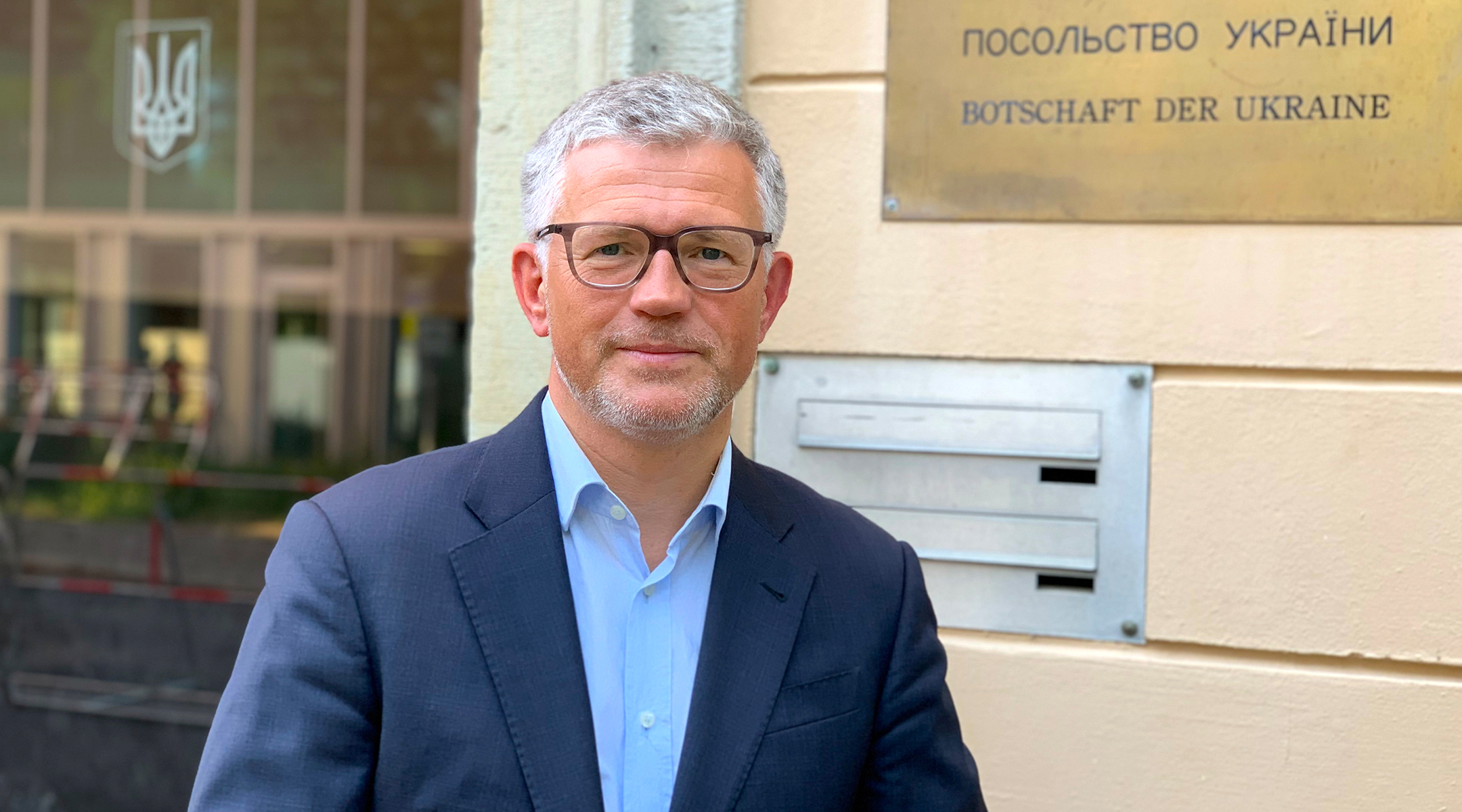
THE LIVER SAUSAGE STORY WITH A HAPPY END
- The other day, you received in Berlin a rather unusual guest – a butcher, who sent you his liver sausage after you made a high-profile and even scandalous move by comparing the German Chancellor with this product. Could you dwell on this story a bit?
- The liver sausage story has really caused quite a storm in Germany, sometimes involving really controversial discussions. And this is natural. I especially liked the reaction of an authentic butcher in the town of Herksheim in Palatinate, who gave an interview to the local newspaper Rheinpfalz, defending the liver sausage’s dignity. His name is Walter Adam. I reached out to him through social media, and he handed over a whole package of his delicacies to try out, and in response I invited him to visit us. He accepted the invitation and came over to Berlin last week.
All this caused a great deal of media coverage, with journalists following Walter and Marion, his wife, literally everywhere on their unusual journey. As a result of such citizen diplomacy, the issue of liver sausage has turned from a stumbling block into a truly unifying factor between the two nations.
Walter himself was incredibly absorbed in the issue of Russia's aggressive war and has now become one of Ukraine's greatest friends, actively mobilizing the public in his region for greater support for Ukraine. In short, thanks to such emotional interpersonal contacts, this story saw a real happy ending.
P.S.
While this interview was being prepared for publication, Melnyk admitted to one of the German media outlets that he regretted making such a comparison with the Chancellor and was ready to personally apologize to Scholz. It should be noted that the ambassador used the German idiom: to behave like a "liver sausage" means to "pretend to be offended."
Olha Tanasiychuk, Berlin
, Berlin
